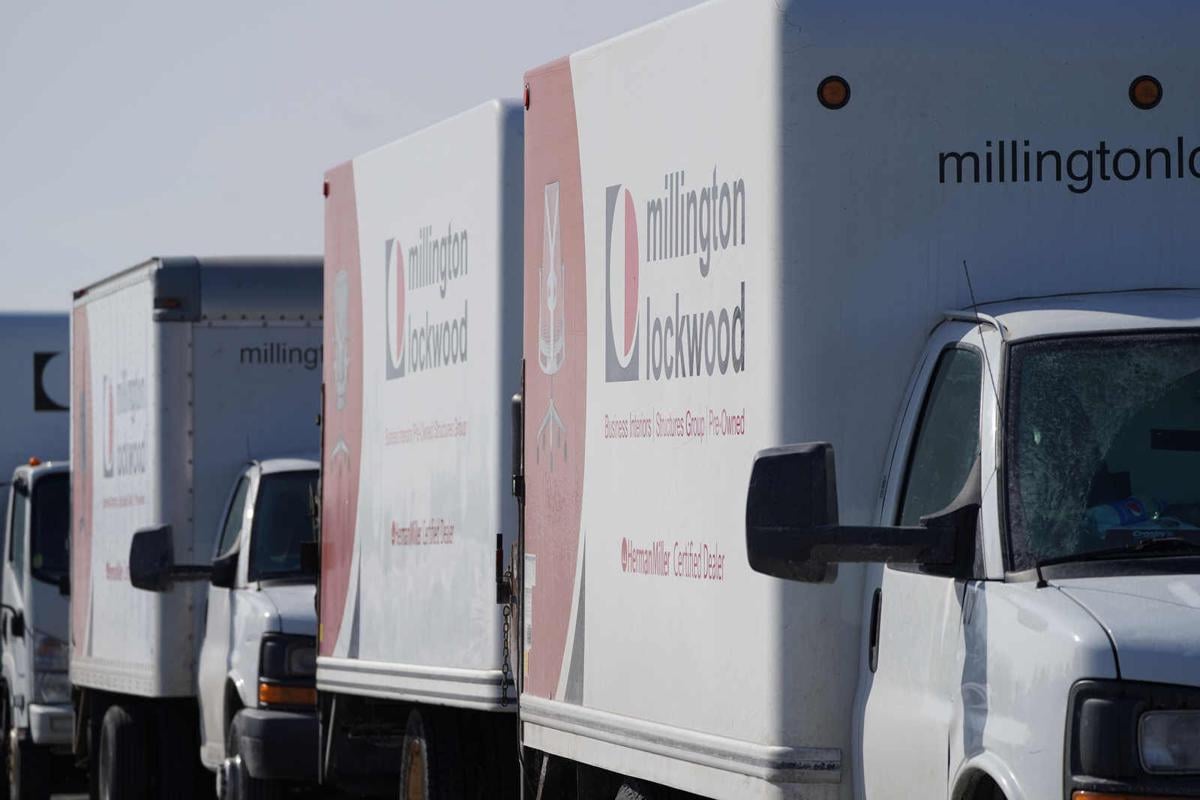
A row of delivery trucks are parked outside Millington Lockwood on Genesee Street in Cheektowaga on Friday. New York State denied GLB Interiors of Cheektowaga certification as a women-owned business in its MWBE program because regulators determined owner Gina Fahey's office furniture company was not "independent" enough from two businesses owned by her father, Millington Lockwood Business Interiors and Richway Refinishing. State records said the three businesses were in the same building and GLB subcontracted with Millington Lockwood and Richway for design, delivery and installation services.
It has been whispered at construction sites across New York for decades. Want access to lucrative government contracts? Put your business in your wife’s name.
But lately, New York State has been booting from its programs companies it says are not authentic woman-owned business enterprises, or WBEs, because the husband, father or brother of the female owner controls the company.
"We need to do that to ensure the integrity of the program," said Goldie Weixel, acting general counsel for Empire State Development. "The purpose is to support woman-owned businesses. It’s not the family-owned business program."
Still, questions remain about how effective the state is at rooting out fraud – and whether state regulators are targeting the very companies their programs were designed to help.
A review of state economic development files and court records by The Buffalo News revealed nearly 500 cases in the last three years where state officials either denied the certification of a woman-owned business or revoked its certification years after the state initially approved it.
Most of those cases involved family businesses where a woman owned a majority stake in the company but a male member of the woman's family either co-owned or had significant roles in the business.
There are financial incentives that might prompt men in the building trades to put their company in their wife's name.
General contractors on state projects are required to hire minority- and woman-owned firms for roughly 30% of the total work on each project. For contracts exceeding $5,000 on any state building, if an MWBE company submits a bid within 10% of the low bidder, the minority- or woman-owned company is automatically deemed the “apparent low bidder” if their bid is for $1.4 million or less.
"The benefits of being certified provide for getting access to opportunities that the broader population would not have access to," said Hope Knight, president and CEO of Empire State Development Corp.
State officials deny they are "cracking down" on phony woman-owned business applications, but their own statistics show they are denying applications for WBEs at more than twice the rate of certification applications for minority-owned businesses.
To be sure, many certified woman-owned businesses are indeed run by women.
But some say regulators are now making up for a lack of vigilance in the past. State audits and court testimony indicate the state in recent years has certified 99% of minority and woman-owned businesses that applied.
Nearly one-third of the certification denials that were appealed in the last three years involved companies that had been let into the program years earlier, before regulators changed their minds and determined the businesses were really controlled by men.
And auditors working for the inspector general and the state comptroller have uncovered schemes where woman-owned businesses allegedly acted as "pass-through" companies for firms owned by men, including one case where a woman subcontracted the work to an independent contractor – her husband.
"There's some legitimate ones out there, but there are a lot of one-woman shell companies, too," said Timothy Crino, a retired FBI agent who investigated MWBE fraud for the state inspector general.
Knight, the state economic development commissioner, rejected the notion that fraud was common in the program.
"Fraud is really not a significant issue for the program," Knight said. "We do see that as the number of applications increase, we do have applications that we have to take a close look at to make sure that they comport with requirements. But from a keeping one up at night perspective, it’s not the kind of thing we’re worried about."
Bookkeeper vs. CFO
When MDS Associates, a medical supply company in Lancaster, reapplied for certification as a WBE, state officials didn't believe Sarah Stec ran the company.
In 2018, Stec had to fight the state to stay in the WBE program after Empire State Development said her husband was responsible for the “core functions” of the business.
“Ms. Stec may play an important backup role,” a state administrative law judge wrote in her denial. “However, the certification requires that the woman owner makes the decisions with respect to the core functions of the company.”
The state had certified MDS Associates as a woman-owned business starting in 1991, records show.
The business was originally owned by Stec's mother-in-law and father-in-law. When her mother-in-law was diagnosed with cancer in 2010, she gave her 51% ownership stake to Stec. Her father-in-law gave his 49% ownership stake to Stec's husband.
The state's Division of Minority and Women’s Business Development had certified the business at least three times, Stec said, before suddenly raising questions in 2018 about the transaction.
The state also said Stec did not demonstrate enough control of the business because her work was "primarily centered on bookkeeping such as processing checks, paying bills, doing payroll, reconciliation of bank statements as well as personnel matters" while her husband handled marketing and sales, supervision of employees and negotiations with vendors.
"If a man is sitting in the office and he's dealing with the finances, he's a CFO. If a woman is doing it, she's the bookkeeper," Stec's lawyer, Kevin T. O'Brien, argued in court while attacking the state's position.
State Supreme Court Justice Paul B. Wojtaszek sided with Stec and ordered the state last month to grant the company's recertification to the WBE program.
Shell company flagged
Gina Fahey, the owner of GLB Interiors in Cheektowaga, got a different result when she challenged the state.
GLB Interiors was denied certification as a WBE in 2017 because state regulators determined Fahey's office furniture company was not "independent" enough from two businesses owned by her father.
Fahey's father, Michael Bonitatibus, was the president of Millington Lockwood Business Interiors and also owned Richway Refinishing. Both businesses were located on Genesee Street across from Buffalo Niagara International Airport – in the same building as GLB Interiors.
Fahey said she leased a separate office suite in the building, but state records described other ties: GLB subcontracted with Millington Lockwood and Richway for design, delivery and installation services.
"She had no inventory," said Crino, who investigated the case for the state inspector general. "She had no employees."
State regulators also said GLB's office "is accessed through the Richway Refinishing warehouse" and did not have its own exterior door. They said the business was "uniquely dependent" on her father's companies.
"It’s basically your Dad’s company, and you’ve created this other, you know, shell company," Crino said.

Millington Lockwood on Genesee Street in Cheektowaga.
An administrative law judge denied her WBE status and wrote that the intent of the program was to "confer program benefits upon minority and women-owned businesses that are most likely to have experienced discrimination in the marketplace, rather than those that enjoy benefits from a connection to a non-WBE firm."
Fahey and her father, who has since retired from Millington Lockwood, did not respond to messages seeking comment. Joseph Conley, the company's current chief executive, confirmed that GLB was no longer operating in the Genesee Street warehouse. He declined to comment further.
How common is fraud?
There are more than 9,200 businesses certified by Empire State Development to benefit from its minority- and woman-owned business enterprises program. New York denied 675 businesses a MWBE certification or recertification in the past three years.
State data obtained by The News through a Freedom of Information Law request show most of the businesses denied certification by ESD were owned by women, not minorities.
In the last three years, WBE applications have accounted for 74% of the certification and recertification denials. The other 26% were for minority-owned businesses or businesses that sought certifications as being owned by a woman who was also a minority.
The state would not provide statistics for the total applications to both programs. But in 2019, a top Empire State Development official testified in court that the state rarely denied applicants.
"It's a very small percentage," testified Raymond Emanuel, director of certification for ESD. "I would say between 1% and 2%."
While Knight said the program is "underpinned with integrity," Crino, the retired state investigator, said it was not hard for him to find instances of fraud or businesses that were let into the program but later kicked out.
"They don’t do any due diligence in the beginning, because there was a time period where their marching orders were to just sign up as many MBEs and WBEs as you can," Crino said, referring to ESD. "They were catching some of them, but there were others they weren’t catching."
State Inspector General Lucy Lang has turned up instances of alleged minority-owned business fraud on the Buffalo Billion economic development program and the Tioga Downs casino in the Southern Tier.
State Comptroller Thomas P. DiNapoli late last year released an audit of the Office of General Services stating that on three of five downstate construction management contracts it reviewed, the WBE-certified business owner subcontracted out all of its approved services to her husband, who was an independent contractor.
Unlike some federal agencies, ESD does not post the results of certification reviews for all MWBE companies to its website. It posts only cases where the businesses appealed the agency's denial. Of the 50 appeals the agency heard in the last three years, 16 involved businesses who previously had been certified as MWBEs by the state.
Hochul proposing changes
Regulators may be trying to root out fraud in the program so that women, who are historically underrepresented in the building trades, are competing on more of an equal playing field with men.
But they also face pressure from politicians who want to make sure the number of MWBE companies in New York keeps going up.
New York officials have boasted that the percentage of state-awarded contracts going to MWBEs – 30% – is the highest in the nation and is triple what the percentage was in 2010.
Knight said decisions are driven by the law, not politics. But in her State of the State address, Gov. Kathy Hochul made it clear she wants to cut red tape and make certification a quicker process for MBEs and WBEs.
One woman business owner in 2017 said in court papers that when she submitted her recertification documents, it took the state two years to respond to her application.
Hochul said high demand has led to "unacceptably long wait times" for businesses trying to access the program. She vowed to provide funding to eliminate the backlog of both MWBE applications and appeals.
"entry" - Google News
March 05, 2022 at 03:27AM
https://ift.tt/irYVcPM
NY denied nearly 500 women-owned businesses entry in MWBE program over 3 years - Buffalo News
"entry" - Google News
https://ift.tt/CQl2at5
https://ift.tt/QRM6Jgk
Bagikan Berita Ini
















0 Response to "NY denied nearly 500 women-owned businesses entry in MWBE program over 3 years - Buffalo News"
Post a Comment